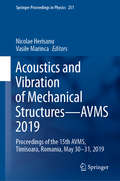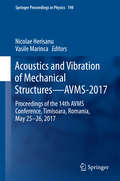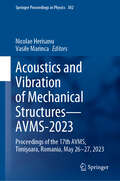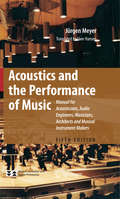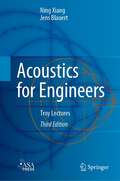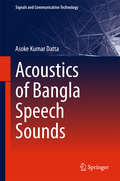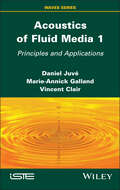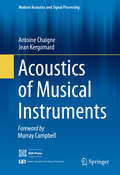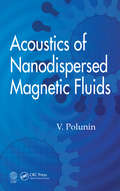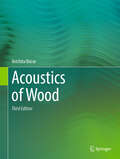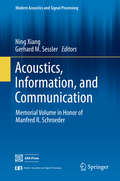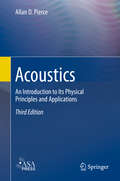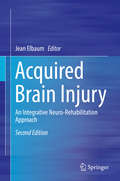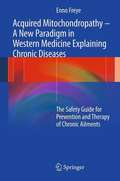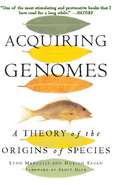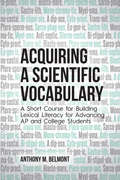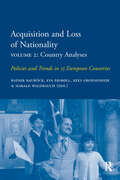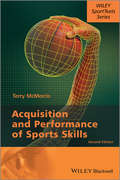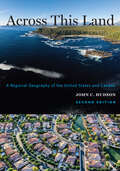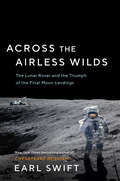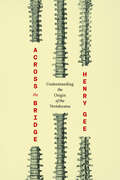- Table View
- List View
Acoustics and Vibration of Mechanical Structures—AVMS 2019: Proceedings of the 15th AVMS, Timisoara, Romania, May 30–31, 2019 (Springer Proceedings in Physics #251)
by Nicolae Herisanu Vasile MarincaThis book contains selected and expanded contributions presented at the 15th Conference on Acoustics and Vibration of Mechanical Structures held in Timisoara, Romania, May 30-31, 2019. The conference focused on a broad range of topics related to acoustics and vibration, such as analytical approaches to nonlinear noise and vibration problems, environmental and occupational noise, structural vibration, biomechanics and bioacoustics, as well as experimental approaches to vibration problems in industrial processes. The different contributions also address the analytical, numerical and experimental techniques applicable to analyze linear and non-linear noise and vibration problems (including strong nonlinearity) and they are primarily intended to emphasize the actual trends and state-of-the-art developments in the above mentioned topics. The book is meant for academics, researchers and professionals, as well as PhD students concerned with various fields of acoustics and vibration of mechanical structures.
Acoustics and Vibration of Mechanical Structures—AVMS-2017: Proceedings of the 14th AVMS Conference, Timisoara, Romania, May 25–26, 2017 (Springer Proceedings in Physics #198)
by Nicolae Herisanu Vasile MarincaThis book is a collection of papers presented at Acoustics and Vibration of Mechanical Structures 2017 - AVMS 2017 - highlighting the current trends and state-of-the-art developments in the field. It covers a broad range of topics, such as noise and vibration control, noise and vibration generation and propagation, the effects of noise and vibration, condition monitoring and vibration testing, modeling, prediction and simulation of noise and vibration, environmental and occupational noise and vibration, noise and vibration attenuators, as well as biomechanics and bioacoustics. The book also presents analytical, numerical and experimental techniques for evaluating linear and non-linear noise and vibration problems (including strong nonlinearity). It is primarily intended for academics, researchers and professionals, as well as PhD students in various fields of the acoustics and vibration of mechanical structures.
Acoustics and Vibration of Mechanical Structures—AVMS-2023: Proceedings of the 17th AVMS, Timişoara, Romania, May 26–27, 2023 (Springer Proceedings in Physics #302)
by Nicolae Herisanu Vasile MarincaThis book presents peer-reviewed and selected papers from the 17th Conference on Acoustics and Vibration of Mechanical Structures (AVMS) held in Timisoara, Romania, on 26–27 May 2023. Internationally recognized experts share their knowledge and key findings in a broad range of topics related to acoustics and vibration of mechanical structures such as analytical, numerical and experimental techniques for noise and vibration problems, environmental and occupational noise and vibration, modelling, prediction and simulations of noise and vibration, noise and vibration control, noise and vibration attenuators. The book addresses application studies and fundamental studies as well, and it is meant for academics researchers and professionals, as well as Ph.D. students concerned with various fields of acoustics and vibration of mechanical structures.
Acoustics and the Performance of Music: Manual for Acousticians, Audio Engineers, Musicians, Architects and Musical Instrument Makers (Modern Acoustics and Signal Processing #Vol. 729)
by Uwe Hansen Jürgen MeyerThis classic reference on musical acoustics and performance practice begins with a brief introduction to the fundamentals of acoustics and the generation of musical sounds. It then discusses the particulars of the sounds made by all the standard instruments in a modern orchestra as well as the human voice, the way in which the sounds made by these instruments are dispersed and how the room into which they are projected affects the sounds.
Acoustics for Engineers: Troy Lectures
by Jens Blauert Ning XiangThis textbook provides materials for an introductory course in Engineering Acoustics for students with a basic knowledge of mathematics. The contents are based on extensive teaching experience at the graduate level. Each of the 14 main chapters deals with a well-defined topic and represents the material for a two-hour lecture. The chapters alternate between more theoretical and more application-oriented concepts. The presentation is organized to be suitable for self-study as well.For this third edition, the complete text and many figures have been revised. Several current amendments take account of advancements in the field. Further, a completely new chapter has been added which presents approaches and solutions to all assigned exercise problems. The new chapter offers the opportunity to explore the underlying theoretical background in more detail. However, the study of the problems and their proposed solutions is no prerequisite for comprehending the material presented in the book's lecture part.
Acoustics of Bangla Speech Sounds (Signals and Communication Technology)
by Asoke Kumar DattaThis book presents the consolidated acoustic data for all phones in Standard Colloquial Bengali (SCB), commonly known as Bangla, a Bengali language used by 350 million people in India, Bangladesh, and the Bengali diaspora. The book analyzes the real speech of selected native speakers of the Bangla dialect to ensure that a proper acoustical database is available for the development of speech technologies. The acoustic data presented consists of averages and their normal spread, represented by the standard deviations of necessary acoustic parameters including e. g. formant information for multiple native speakers of both sexes. The study employs two important speech technologies:(1) text to speech synthesis (TTS) and (2) automatic speech recognition (ASR). The procedures, particularly those related to the use of technologies, are described in sufficient detail to enable researchers to use them to create technical acoustic databases for any other Indian dialect. The book offers a unique resource for scientists and industrial practitioners who are interested in the acoustic analysis and processing of Indian dialects to develop similar dialect databases of their own.
Acoustics of Fluid Media 1: Principles and Applications (ISTE Invoiced)
by Vincent Clair Daniel Juvé Marie-Annick GallandAcoustics of Fluid Media 1 is intended for undergraduate students and engineering students, as well as graduate students and professionals in the industry who are increasingly faced with the need to consider acoustic constraints in the design of new products. The physical principles and theoretical foundations of acoustics in fluids are first developed, including reflection and refraction of plane and spherical waves. The book then introduces notions of signal processing applied to sound waves, followed by radiation from surface or volume acoustic sources and the use of Green’s functions, as well as the description of diffraction and scattering phenomena. The final chapters are devoted to sound propagation in ducts and room acoustics. Each chapter is accompanied by a limited number of exercises, ranging from the simple application of formulas to problems requiring a more advanced theoretical analysis or a numerical solution. Throughout the book, the theoretical results are illustrated with numerous figures obtained from measurements or numerical simulations resulting from the evaluation of complex formulas or from the use of a finite element solver.
Acoustics of Musical Instruments (Modern Acoustics and Signal Processing)
by Antoine Chaigne Jean KergomardThis book, the first English-language translation of Acoustique des instruments de musique, Second Edition, presents the necessary foundations for understanding the complex physical phenomena involved in musical instruments. What is the function of the labium in a flute? Which features of an instrument allow us to make a clear audible distinction between a clarinet and a trumpet? With the help of numerous examples, these questions are addressed in detail. The authors focus in particular on the significant results obtained in the field during the last fifteen years. Their goal is to show that elementary physical models can be used with benefit for various applications in sound synthesis, instrument making, and sound recording. The book is primarily addressed to graduate students and researchers; however it could also be of interest for engineers, musicians, craftsmen, and music lovers who wish to learn about the basics of musical acoustics.
Acoustics of Nanodispersed Magnetic Fluids
by V. PoluninAcoustics of Nanodispersed Magnetic Fluids presents key information on the acoustic properties of magnetic fluids. The book is based on research carried out by the author as well as on many publications in both the Russian and foreign scientific literature from 1969 onwards.It describes a wide variety of topics, which together lay the foundation of
Acoustics of Wood
by Voichita BucurThe Third Edition of Acoustics of Wood offers a comprehensive overview of advanced acoustical techniques for wood characterization and assessment. It stands as an authoritative guide on using ultrasound and acoustic emissions to assess and characterize wood's physical and mechanical properties. Divided into six parts, this extended and updated edition covers a broad spectrum of topics including ultrasonic wave propagation, nondestructive testing methods for wood characterization, and the innovative use of acoustics in quality assessment of wood products. It also explores the acoustic properties vital for musical instruments and the application of acoustics in preserving historically significant art objects and timber structures. With chapters on cutting-edge topics like artificial intelligence's role in wood acoustics, readers are invited to explore the intersection of tradition and technology. Targeted at professionals and researchers in materials science, engineering, and conservation, this edition is invaluable for those seeking to deepen their knowledge of wood's acoustic properties. Readers with a background in physics or engineering will find the discussions on ultrasonic techniques and acoustic emissions particularly enlightening. By bridging theoretical concepts with practical applications, this book not only enriches scientific understanding but also opens up new avenues for innovation in wood assessment and preservation.
Acoustics, Information, and Communication: Memorial Volume in Honor of Manfred R. Schroeder (Modern Acoustics and Signal Processing)
by Ning Xiang Gerhard M. SesslerThis book explores the life and scientific legacy of Manfred Schroeder through personal reflections, scientific essays and Schroeder's own memoirs. Reflecting the wide range of Schroeder's activities, the first part of the book contains thirteen articles written by his colleagues and former students. Topics discussed include his early, pioneering contributions to the understanding of statistical room acoustics and to the measurement of reverberation time; his introduction of digital signal processing methods into acoustics; his use of ray tracing methods to study sound decay in rooms and his achievements in echo and feedback suppression and in noise reduction. Other chapters cover his seminal research in speech processing including the use of predictive coding to reduce audio bandwidth which led to various code-excited linear prediction schemes, today used extensively for speech coding. Several chapters discuss Schroeder's work in low-peak factor signals, number theory, and maximum-length sequences with key applications in hearing research, diffraction gratings, artificial reverberators and de-correlation techniques for enhancing subjective envelopment in surround sound. In style, the articles range from truly scientific to conversationally personal. In all contributions, the relationship between the current research presented and Manfred Schroeder's own fields of interest is, in general, evident. The second part of the book consists of Schroeder's own memoirs, written over the final decade of his life. These recollections shed light on many aspects not only of Schroeder's life but also on that of many of his colleagues, friends and contemporaries. They portray political, social and scientific events over a period that extends from pre-war to the present. These memoirs, written in an inimitable and witty style, are full of information, entertaining and fun to read, providing key insight into the life and work of one of the greatest acousticians of the 20th century.
Acoustics: An Introduction to Its Physical Principles and Applications (Physical Acoustics Ser. #Volume 19)
by Allan D. PierceThis corrected version of the landmark 1981 textbook introduces the physical principles and theoretical basis of acoustics with deep mathematical rigor, concentrating on concepts and points of view that have proven useful in applications such as noise control, underwater sound, architectural acoustics, audio engineering, nondestructive testing, remote sensing, and medical ultrasonics.Since its publication, this text has been used as part of numerous acoustics-related courses across the world, and continues to be used widely today. During its writing, the book was fine-tuned according to insights gleaned from a broad range of classroom settings. Its careful design supports students in their pursuit of a firm foundation while allowing flexibility in course structure. The book can easily be used in single-term or full-year graduate courses and includes problems and answers. This rigorous and essential text is a must-have for any practicing or aspiring acoustician.
Acquired Brain Injury: An Integrative Neuro-Rehabilitation Approach
by Jean ElbaumThis book presents a comprehensive interdisciplinary team approach to the rehabilitation of acquired brain injury (ABI) survivors. Medical and clinical specialists will receive a deeper understanding of not only each other’s roles but of their complementary functions in this field. Many case examples are provided, illustrating a wide range of challenges and stages of recovery. This edition features 3 entirely new chapters and multiple updated chapters by new and returning authors.Featured in the coverage: The role of Robotics in acquired brain injuryA comprehensive chapter on physical therapy in ABIOutstanding recoveries woven together by a video news producer who recovered from a meningioma State of the art updates on neurosurgery, neurology, physiatry, neuropsychiatry and neuro-optometry.Updated chapters on neuropsychology, speech-language and occupational therapies including new technology and approaches as well as evidence based practicesPsychosocial challenges and treatment following ABIThe importance of family as team membersPost rehabilitation options and experiencesAcquired Brain Injury: An Integrative Neuro-Rehabilitation Approach, 2nd edition provides clarity and context regarding the rehabilitation goals and processes for rehabilitation specialists, interdisciplinary students of neuro-rehabilitation as well as practicing clinicians interested in developing their knowledge in their field.
Acquired Language Disorders in Adulthood and Childhood: Selected Works of Elaine Funnell (World Library of Psychologists)
by Andrew W Ellis Nicola PitchfordIn the World Library of Psychologists series, international experts present career-long collections of what they judge to be their finest pieces - extracts from books, key articles, salient research findings, and their major practical theoretical contributions. Elaine Funnell has played an important role in the study of neuropsychology over the past 25 years. She has been at the forefront of groundbreaking research on individuals suffering with acquired disorders of written and/or spoken language resulting from brain damage. With commentary by Nicola Pitchford and Andrew Ellis, this volume presents Elaine’s most significant contributions in her two main specialist areas: adult neuropsychology of semantic disorders, with a focus on disorders of naming in dementia, and acquired language and literacy disorders in childhood. The publications included in this volume date back to 1988, where Elaine co-authored a major review of theories regarding the representation of meanings in the mind and brain. They then bring us right up-to-date with a previously unpublished paper from 2010, which has been recently edited by the co-author, Mike Kopelman, for this edition. Through her exceptional work, Elaine has greatly advanced our understanding of the brain processes behind written and spoken language, and this book represents an original and timely contribution to the field. Acquired Language Disorders in Adulthood and Childhood will be of great interest to researchers and postgraduate students in adult and child neuropsychology, specifically for those specialising in semantic and language disorders.
Acquired Mitochondropathy – A New Paradigm in Western Medicine explaining Chronic Diseases
by Enno FreyeThe book on Acquired Mitochondropathy offers a new perspective on the understanding and the treatment of chronic ailments. Addressing a new paradigm deemed necessary, since in one of every four adults in the western world chronic ailments are on the rise. Resulting from energy dysfunction of cellular organelles, the mitochondria, the most of the common symptoms the physician faces during medical consultation are presented. An increasing focus on chronic disabilities presents difficulties for the busy practitioner, since patients typically describe a complex pattern of discomfort, disability, and distress, with pain affecting physical, social, and psychological functioning, which have to be put in the proper perspective. Since clinicians must efficiently condense widely varied symptomatic descriptions into characteristic patterns to permit accurate diagnosis and implement effective treatment, this book serves as a useful educational resource for the healthcare provider.
Acquiring Genomes: A Theory of the Origins of Species
by Lynn Margulis Dorion SaganHow do new species evolve? Although Darwin identified inherited variation as the creative force in evolution, he never formally speculated where it comes from. His successors thought that new species arise from the gradual accumulation of random mutations of DNA. But despite its acceptance in every major textbook, there is no documented instance of it. Lynn Margulis and Dorion Sagan take a radically new approach to this question. They show that speciation events are not, in fact, rare or hard to observe. Genomes are acquired by infection, by feeding, and by other ecological associations, and then inherited. Acquiring Genomes is the first work to integrate and analyze the overwhelming mass of evidence for the role of bacterial and other symbioses in the creation of plant and animal diversity. It provides the most powerful explanation of speciation yet given.
Acquiring a Scientific Vocabulary: A Short Course for Building Lexical Literacy for Advancing AP and College Students
by Anthony M. BelmontA short course specifically designed for high school AP science students and college freshmen or sophomores in any science courses to provide an understanding of how scientific terminology is composed and to give students a 'ballpark' knowledge of terms t
Acquisition and Analysis of Terrestrial Gravity Data
by Leland Timothy Long Ronald Douglas KaufmannGravity surveys have a huge range of applications, indicating density variations in the subsurface and identifying man-made structures, local changes of rock type or even deep-seated structures at the crust/mantle boundary. This important one-stop book combines an introductory manual of practical procedures with a full explanation of analysis techniques, enabling students, geophysicists, geologists and engineers to understand the methodology, applications and limitations of a gravity survey. Filled with examples from a wide variety of acquisition problems, the book instructs students in avoiding common mistakes and misconceptions. It explores the increasing near-surface geophysical applications being opened up by improvements in instrumentation and provides more advance-level material as a useful introduction to potential theory. This is a key text for graduate students of geophysics and for professionals using gravity surveys, from civil engineers and archaeologists to oil and mineral prospectors and geophysicists seeking to learn more about the Earth's deep interior.
Acquisition and Loss of Nationality|Volume 2: Policies and Trends in 15 European Countries (IMISCOE Research)
by Kees Groenendijk Harald Waldrauch Eva ErsbøllNationality and citizenship have been subjects of stormy policy debates in many EU countries in recent years. Concerns over the integration of immigrants, but also attempts to forge links with emigrants, have led to changes in the laws regulating loss and acquisition of nationality and citizenship. This title outlines the research conducted by a team of 30 researchers into the nationality laws and their implementation in 15 EU member states. Volume 2www.imiscoe.org.Volume 1 & 2 are also available as a set, This is the most comprehensive comparative study of the legal status of nationality so far and it will become an indispensable source of reference for further research.For more information see: http://www.imiscoe.org/natac/
Acquisition and Performance of Sports Skills
by Terry McMorrisAn extensive update of a successful textbook on skill acquisition for sport students. Praised for its clarity of writing style and presentation the new edition will be an essential buy for those needing a practical, sport-focused introduction to the theory and application of human motor skills.
Acquisition and Performance of Sports Skills
by Terry McmorrisAn extensive update of a successful textbook on skill acquisition for sport students. Praised for its clarity of writing style and presentation the new edition will be an essential buy for those needing a practical, sport-focused introduction to the theory and application of human motor skills.
Across This Land: A Regional Geography of the United States and Canada (Creating the North American Landscape)
by John C. HudsonA fascinating overview of the lands and peoples of the United States and Canada, both past and present.Based on decades of research and written in clear, concise prose by one of the foremost geographers in North America, John C. Hudson's Across This Land is a comprehensive regional geography of the North American continent. Dividing the terrain into ten regions, which are then subdivided into twenty-seven smaller areas, Hudson's brisk narrative reveals the dynamic processes of each area's distinctive place-specific characteristics. Focusing on how human activities have shaped and have been shaped by the natural environment, Hudson considers physical, political, and historical geography. He also highlights related topics, including resource exploitation, economic development, and population change. Praised in its first edition as a readable and reliable interpretation of United States and Canadian geography, the revised Across This Land retains these strengths while adding substantial new material. Incorporating the latest available population and economic data, this thoroughly updated edition includes• reflections on new developments, such as resource schemes, Native governments in Atlantic Canada, and the role of climate change in the Arctic• a new section focused on the US Pacific insular territories west of Hawaii• evolving views of oil and gas production resulting from the introduction of hydraulic fracturing• revised text and maps involving agricultural production based on the 2017 Census of Agriculture• current place names• more than 130 photographsThe most extensive regional geography of the North American continent on the market, Hudson's Across This Land will continue as the standard text in geography courses dealing with Canada and the United States, as well as a popular reference work for scholars, students, and lay readers.
Across a Star-Swept Sea
by Diana PeterfreundFrom Rampant and Ascendant author Diana Peterfreund comes this thrilling companion to For Darkness Shows the Stars. Centuries after wars nearly destroyed civilization, Persis Blake's world is once again in the throes of rebellion. For Persis, her public life is that of a socialite, filled with parties and ball gowns. But while she seems to be a frivolous aristocrat, inside Persis beats the heart of a spy—the same heart that is falling for the enemy, Justen Helo. Persis's heart belongs to Justen, but before she can tell him the truth, she discovers he has a secret as well—one that could plunge their tropical paradise into another dark age. And Persis realizes she's not just risking her heart, she's risking the world she's sworn to protect. Across a Star-Swept Sea is a romantic, science-fictional reimagining of the classic The Scarlet Pimpernel.
Across the Airless Wilds: The Lunar Rover and the Triumph of the Final Moon Landings
by Earl Swift"THRILLING. ... Up-end[s] the Apollo narrative entirely." —The Times (London)A "brilliantly observed" (Newsweek) and "endlessly fascinating" (WSJ) rediscovery of the final Apollo moon landings, revealing why these extraordinary yet overshadowed missions—distinguished by the use of the revolutionary lunar roving vehicle—deserve to be celebrated as the pinnacle of human adventure and exploration.One of The Wall Street Journal's 10 Best Books of the Month8:36 P.M. EST, December 12, 1972: Apollo 17 astronauts Gene Cernan and Jack Schmitt braked to a stop alongside Nansen Crater, keenly aware that they were far, far from home. They had flown nearly a quarter-million miles to the man in the moon’s left eye, landed at its edge, and then driven five miles in to this desolate, boulder-strewn landscape. As they gathered samples, they strode at the outermost edge of mankind’s travels. This place, this moment, marked the extreme of exploration for a species born to wander. A few feet away sat the machine that made the achievement possible: an electric go-cart that folded like a business letter, weighed less than eighty pounds in the moon’s reduced gravity, and muscled its way up mountains, around craters, and over undulating plains on America’s last three ventures to the lunar surface. In the decades since, the exploits of the astronauts on those final expeditions have dimmed in the shadow cast by the first moon landing. But Apollo 11 was but a prelude to what came later: while Neil Armstrong and Buzz Aldrin trod a sliver of flat lunar desert smaller than a football field, Apollos 15, 16, and 17 each commanded a mountainous area the size of Manhattan. All told, their crews traveled fifty-six miles, and brought deep science and a far more swashbuckling style of exploration to the moon. And they triumphed for one very American reason: they drove.In this fast-moving history of the rover and the adventures it ignited, Earl Swift puts the reader alongside the men who dreamed of driving on the moon and designed and built the vehicle, troubleshot its flaws, and drove it on the moon’s surface. Finally shining a deserved spotlight on these overlooked characters and the missions they created, Across the Airless Wilds is a celebration of human genius, perseverance, and daring.
Across the Bridge: Understanding the Origin of the Vertebrates
by Henry Gee“Addresses an important topic for biologists and zoologists about vertebrates’ place in the ‘grand scheme’ . . . genuinely witty and charming . . . magnificent.” —Neil J. Gostling, University of SouthamptonOur understanding of vertebrate origins and the backbone of human history evolves with each new fossil find and DNA map. Many species have now had their genomes sequenced, and molecular techniques allow genetic inspection of even non-model organisms. But as longtime Nature editor Henry Gee argues in Across the Bridge, despite these giant strides and our deepening understanding of how vertebrates fit into the tree of life, the morphological chasm between vertebrates and invertebrates remains vast and enigmatic.As Gee shows, even as scientific advances have falsified a variety of theories linking these groups, the extant relatives of vertebrates are too few for effective genetic analysis. Moreover, the more we learn about the species that do remain—from sea-squirts to starfish—the clearer it becomes that they are too far evolved along their own courses to be of much use in reconstructing what the latest invertebrate ancestors of vertebrates looked like. Fossils present yet further problems of interpretation. Tracing both the fast-changing science that has helped illuminate the intricacies of vertebrate evolution as well as the limits of that science, Across the Bridge helps us to see how far the field has come in crossing the invertebrate-to-vertebrate divide—and how far we still have to go.“A beautiful ode to some of the least appreciated animals . . . guides the reader joyfully through deuterostomes—weaving disparate elements of embryology, paleontology, and morphology into an unprecedented and accessible narrative.” —Jakob Vinther, University of Bristol
